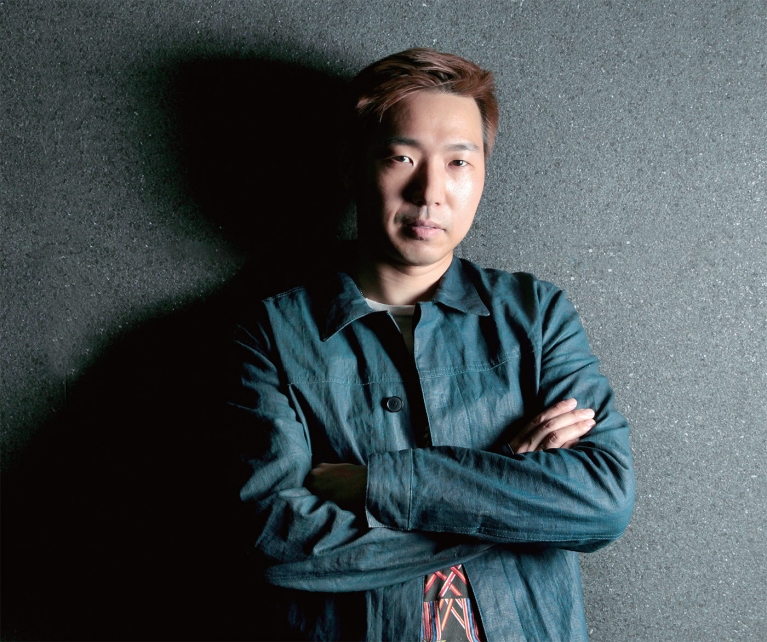South Korea is a country where large-scale online and mobile games are all the rage. It is so used to game titles that offer battles and competitions involving tens or hundreds of thousands of players at once. Hwang Jae-ho, Division Manager of Nexon MintRocket, however, has scored a global megahit with a single-player game deemed as non-mainstream in Korea, signaling to the world the emergence of a superstar game creator.

▎Hwang's game, Dave the Diver, is the only non-mainstream game of Korea to become a global hit. |
|
Korea is recognized as a global gaming powerhouse. According to the Ministry of Culture, Sports, and Tourism's “Game White Paper of Korea 2023,” Korea ranked fourth (7.8%) in the global game industry as of 2022 after the US (22.8%), China (22.4%), and Japan (9.6%). However, the country still needs to work on its competitiveness as its strength is only confined to certain genres. Compared to online and mobile games, which use PCs and smartphones as their main platforms, single-player games, called “package games” in Korea as they used to be sold in physical packages, have not achieved the same status. When it comes to online and mobile games, Korea boasts hits like MapleStory, Lineage, and PUBG, mostly free-to-play games based on web which generate revenues by selling paid items to users. The games theselves are free to play, but users have to pay to get the items and features they want. Package games, however, are purchased at the game distribution channels on a pay-per-play basis. These games are sold as a complete package without the need for additional payments.Online and mobile games and single-player games also have distinct markets. While single-player games are the mainstream in the West, such as the US (North America) and Europe, online and mobile games are the mainstream in Asian markets, including Korea. This is why Korean game companies are intent on developing and selling MMORPGs. Indeed, if you look at major export markets of Korea, they are concentrated in Asia with China as the overwhelming No. 1 (30.1%), followed by Hong Kong, Taiwan, Japan, and Southeast Asia. Meanwhile, the share of exports to the global mainstream market, which is North America and Europe, is only 11.5% and 9.8% respectively.It was a huge surprise, therefore, for the gaming industry both home and abroad, that Dave the Diver (Dave), a single-player game released by MintRocket, Nexon’s sub-brand, became an unprecedented global megahit last year. Nowadays, few Korean game developers even bother to make a “package game” for single players to enjoy from start to finish. But Dave definitely has a unique appeal. It doesn’t show any battle scenes with fancy weapons. Instead, it features a plumpy diver named Dave fishing in the ocean for the day and running a sushi restaurant with his catch at night.It didn't take long for the single-player game of the unique “hybrid maritime adventure” genre to be praised by gamers all over the world. On June 28, 2023, Dave was released on Steam, the world's largest online game distribution platform, and became the No.1 global paid game on its first day. The Nintendo Switch and PlayStation versions were released soon after, and as of the end of June this year, it became the first Korean single-player game to have more than four million copies sold worldwide. This makes Dave the only Korean game in a non-mainstream genre achieving a success in the West, the world's largest gaming market.
Scoring a megahit with just 5 developersThe man behind Dave's unprecedented success is Hwang Jae-ho, Division Manager of MintRocket. Launched as Nexon’s sub-brand in 2022, MintRocket aims to develop fun, casual games based on novel ideas, unlike MMORPGs that require large-scale manpower and capital. Its approach is to achieve fun, creativity, and novelty with a small team of creators, programmers and art designers for development and production. Recognized for the huge success of Dave, MintRocket has now been elevated to a headquarters level under Nexon Group. Hwang, who led the Dave team within MintRocket, has also been promoted to Division Manager, taking charge of the entire MintRocket organization.Hwang joined Nexon in 2006 while still in college as part of a university internship program. He was given the opportunity to explore the Chinese market, and thanks to his Chinese major, he was offered a full-time position later on. It was a welcome offer for a geek who had been playing Super Mario since he was a kid.“Back then, Nexon's Crazy Arcade was very popular in China, and I didn't know much about Korean games because I lived in Japan during my childhood, but I was strongly impressed to see Korean games doing well overseas, which is why I decided to join Nexon.”Since joining Nexon, Hwang has worked as Project Manager (PM) in China, Taiwan, Vietnam, and the US (Nexon America). His job was to fine-tune games developed and released in Korea to suit the local markets. Nowadays, the overall game experience is the same in all languages, but back in those days, the service content, items, payment methods, and others were different by country, so it was essential to work with local partners. After working as the PM of Mabinogi Hero Wars at Nexon America, Hwang started a social media company and ran it for two to three years. After struggling with the lack of a proper revenue model, however, he decided to rejoin Nexon in 2016.“Nexon gave me another chance. 'We’ll give you an opportunity to develop a game again,' but with a minimum team size of five people,” he says. ”The first game we developed was Evil Factory. We worked at Neople, a subsidiary in Jeju Island, and we got one million downloads in a month, which wasn't bad.”The small team of Hwang, two programmers, and two artists was definitely a new structure for Nexon. Although Evil Factory didn't make huge money as it didn’t have a revenue model typical of mobile games, they were well received by gamers and the industry.After seeing the successful market launch of Evil Factory, Nexon formed a new independent development team called Studio 42. Hwang, named as head of the team and game creator, followed up by developing the second game based on the Godzilla IP and then Dave. But going through organizational restructuring at that time, Nexon Group pulled the plug on the project.“To be frank, once a game is folded, that's usually the end of it, but Dave was resurrected a year later as a single-player game for PC, and it was so well-received in our first internal review, although Nexon was a company that had grown by releasing large MMORPGs. Dave survived because it was written in a way we hadn't seen before, thanks to its grammar completely different from the norm, and focus on fun rather than marketability.”
The only single-player game of Korea reaping a success in the Western marketsDramatically resurrected from the brink of extinction, Dave became a success story that is so glamorous to rewrite Korea’s gaming history. As of the end of June, more than 90% of the four million copies sold were overseas, with Western regions such as North America and Europe accounting for about 48% of the total. Dave is practically the only success case Korea made in the West with its non-mainstream, single-player game.Overseas user reviews are also the highest among Korean games. Metacritic, the world's largest game review site, and OpenCritic, a review site specialized in console and PC games in North America, both gave the game a score of 90 or higher. This is the highest score ever for a Korean game, and especially on Metacritic, it earned a “Must Play” badge last year. This is also the first for a Korean game. As of June this year, more than 98,000 people have left reviews on Steam, and 97% of them gave the highest review rating (overwhelmingly positive).Media and critics around the world have also been favorably impressed. New York Times and The Washington Post in the US as well as The Guardian, The Economist, and Financial Times in the UK have all named Dave as one of the “best games of the year 2023”. In April, Dave also won the “Game Design” category at the BAFTA Game Awards 2024 of the UK, which is an annual award ceremony for games organized by the British Academy of Film and Television Arts (BAFTA). It is the first Korean game ever that won an award at the BAFTA.The industry attributes Dave's success to its novelty and originality. This is where Hwang's role in overseeing the game's overall content, theme, genre, characters, story, and structure comes into play.“Single-play games are all about a complete story led by one character, the protagonist. It's a genre that focuses on storytelling like showing a single movie. From the title, it's clear that this game is about a diver named Dave. I personally like this genre, which influenced how I designed this game. It's hard to build your own character in a large-scale online game, but with Dave, users can feel the highs and lows like watching a movie.”Using pixel arts based on 2D dot graphics, different from the sophisticated graphics of today’s games, became another factor of Dave’s popularity. Hwang explains this as “crudeness that invites imagination and immersion.” Indeed, each of Dave‘s artworks fans have created is also full of personality. In the past, pixel art was used because no other options were available, but recently it has drawn popularity due to its unique appeal. “We wanted Dave to be perceived as a piece of art,” Hwang says, smiling, ”and I think that's exactly how it was received.”
Dave has been born by combining the strengths of the two companies – the independence of MintRocket and the gigantic size and experience of Nexon. A case in point is how it adopted a user-friendly approach for the game’s development and operation, which is quite rare to be seen in a single-player game. If you look at over 100,000 new single-player games released every year on Steam, you can find most of them are staying there without updates for a long time, but Dave offered early access from the beginning.“We're not Nintendo, so how can we predict what people want and then put out a perfect game? That's why we chose early access. Early access is a strategy largely used by online games, because finding a delicate balance is really crucial for those games. But single-player games usually don’t offer early access as it could ruin the freshness they are loved for. During eight months of early access, we polished Dave every day. We didn't add a new story, but were very responsive to user requests to make the game more usable and enjoyable, which deepened user loyalty as they saw the game getting better by incorporating their inputs, making them think, ‘they are actually listening to us!' Naturally, they became our ambassadors by the time the early access ended.”This strategy generated interest from users and media alike even before the game's official release. IGN, the largest gaming media in North America, gave Dave a 9 out of 10 rating a week before the official launch. “It was a moment that really turned our team upside down with excitement,” said Hwang. The team still visits Discord and other famous gaming communities overseas everyday and leave responses to user comments. This is the result of the team efforts, including Hwang.Replicating Dave's success in all projects of MintRocket is a challenge that Hwang is facing now. For Hwang, the keyword is “systematization”.“There were definitely some accidental achievements, but the team has its own unique stats, so it’s our role to systematize them into a single stream. We need to turn the experiences that have built up a good legacy into a system, and put out a good quality product based on that. We also want to introduce advanced development methods from overseas game companies. Above all, I don't want Dave to be a ‘one-hit wonder,' and personally hope to expand it into a long-lasting IP that Nexon is proud of.”














